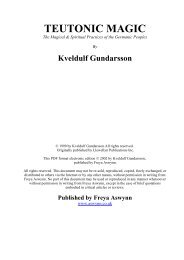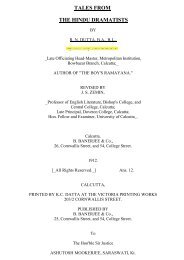Untitled - Awaken Video
Untitled - Awaken Video
Untitled - Awaken Video
Create successful ePaper yourself
Turn your PDF publications into a flip-book with our unique Google optimized e-Paper software.
Chapter 4. The Sky Connection 91<br />
In fact, Grimm was even unable to any names of heavenly bodies that would indicate<br />
any form of divination:<br />
“Our old Heathen fancies about the fixed stars have for the most part faded<br />
away, their very names are all supplanted by learned astronomic appellations;<br />
only a few have managed to save themselves in ON. legend or among common<br />
people.” 4<br />
Of the names which have come down to us in modern times, none indicate an<br />
astrological system of any kind.<br />
Many of the Anglo-Saxon herbals or “leechbooks” also mention propitious days<br />
for collecting herbs, blood-letting, making charms, etc., but most of this information<br />
seems to have been imported from the medical systems which came with the Romans<br />
and later with the monks. That the night sky was important to the Germanic people<br />
has been known since the time of the Roman historian Tacitus. In his Germania,<br />
written around 0 CE, he writes that<br />
“except in the case of accident or emergency, they [the Germanii] assemble<br />
on certain particular days, either shortly after the new moon or shortly before<br />
the full moon. These they hold are the most auspicious times for embarking<br />
on any enterprise.” 5<br />
Even though indigenous northern European astrology is an interesting concept, its<br />
existence is not borne out by any of the facts as they exist today and does not<br />
appear to have had any place of importance in the Northern scheme of things.<br />
The ancient Germanic peoples were privy to much “scientific information” and<br />
many very sophisticated technologies, such as navigation and time-keeping by the<br />
stars, but these do not appear in written form. They also understood well the<br />
techniques of “damascened” steel for sword-making, fancy metal-working for jewelry,<br />
very sophisticated techniques for boat-building, and had developed military<br />
strategy into an art-form which allowed them to rule northern Europe for almost<br />
a half millennium, but for them, writing seems to have been an art form reserved<br />
primarily for poetry, stories, and their dearly loved histories of families, communities,<br />
and nations, not for the transmission of technical information. Incidental pieces of<br />
information pertaining to the northern sciences and technologies did find their way<br />
into some of the sagaic and historical writings but as literary techniques to lend<br />
credibility to their stories and as “fill-in.” Therefore, any claims to the discovery<br />
of an indigenous northern European astrological system should be regarded as pure<br />
4 ibid. p. 723.<br />
5 In Tacitus: The Agricola and the Germania tr. by H. Mattingly (Penguin Books, New York)<br />
p. 110, 1970.
















